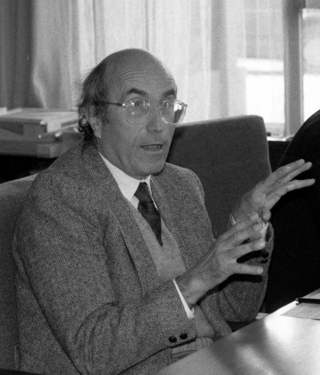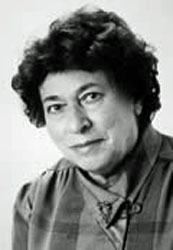External links
- Personal homepage in German and English, with complete bibliography
- Gerhardt's page at the University of Heidelberg (link not active as of 12 Sept 2013)
Uta Gerhardt | |
|---|---|
| Born | June 11, 1938 |
| Academic background | |
| Alma mater | University of Konstanz |
| Academic work | |
| Main interests | German sociology |
Uta Gerhardt (born 11 June 1938 in Zella-Mehlis,Germany) is a German sociologist and professor emeritus at the University of Heidelberg. She studied sociology,philosophy and history at the universities of Frankfurt am Main and Berlin. In 1969,she obtained a Ph.D. at the University of Konstanz. The focus of her work is on medical sociology,structural-functionalist role theory,and general sociological theory. She also wrote a major biography of Talcott Parsons.
Uta Gerhardt is not to be confused with the feminist German sociologist Ute Gerhard.

Niklas Luhmann was a German sociologist, philosopher of social science, and a prominent thinker in systems theory.

Norbert Elias was a German sociologist who later became a British citizen. He is especially famous for his theory of civilizing/decivilizing processes.
Ernst Tugendhat is a Czech-born German philosopher. He is a scion of the wealthy and influential Jewish Tugendhat family.

Sabine Hark is a German feminist and sociologist, and sits on the editorial board of the journal Feministische Studien .

Alfred Vierkandt was a German sociologist, ethnographer, social psychologist, social philosopher and philosopher of history. He is known for a broad and phenomenological Gesellschaftslehre promulgated in the 1920s, and for his formal sociology.
Otfried Höffe is a German philosopher and professor.
Dieter Claessens was a German sociologist and anthropologist.
Irmela Hijiya-Kirschnereit b. is a distinguished German Japanologist and Translator. In 1992 she was awarded Germany's most prestigious prize for distinction in research, the Gottfried Wilhelm Leibniz Prize.
Albert Salomon was a German-Jewish sociologist. He was the nephew of Alice Salomon, a pioneer of the academic discipline of social work.
Anselm Haverkamp is a German-American professor of literature and philosophy.

Rüdiger Lautmann is a German professor of sociology and one of the most prominent LGBT scholars in Germany.

Walter Höllerer was a German writer, literary critic, and literature academic. He was professor of literary studies at the Technical University of Berlin from 1959 to 1988. Höllerer was a member of the Group 47, founder of the German literary magazine Akzente (1953) and the Literary Colloquium of Berlin (1963).

Ingeborg Weber-Kellermann was a German folklorist, anthropologist and ethnologist. She was an academic teacher, from 1946 at the German Academy of Sciences at Berlin in East Berlin and from 1961 at the University of Marburg.
Heinrich Popitz was a German sociologist who worked towards a general sociological theory. Alongside thinkers like Helmut Schelsky, Hans Paul Bahrdt, Dieter Claessens, and others he was one of those sociologists in post-war Germany who founded their sociological reflections on insights from Philosophical Anthropology, thus creating an alternative to the then dominant paradigms of the Frankfurt School and Cologne School. His work revolves around the four central concepts power, norms, technology, and creativity.
Hans-Jörg Rheinberger is an historian of science who comes from Liechtenstein. He was director of the Max Planck Institute for the History of Science in Berlin from 1997 to 2014. His focus areas within the history of science are the history and epistemology of the experiment, and further the history of molecular biology and protein biosynthesis. Additionally he writes and publicizes essays and poems.

Elena Esposito is an Italian sociologist who works in the field of social systems theory. She teaches general sociology at Bielefeld University (Germany) and prediction and the future of public policy at the University of Bologna (Italy). Her research is embedded in Luhmannian social systems theory.
Andreas Reckwitz is a German sociologist and cultural theorist. He is professor at the institute of social sciences at Humboldt University Berlin.

Peter Wicke is a German musicologist, who is particularly interested in popular music; he teaches as a university professor at Humboldt-Universität zu Berlin.
Wilhelm Emil Mühlmann was a German ethnologist who served as Professor of Ethnology at the University of Mainz and Chair of Ethnology at the University of Heidelberg.

Ulrich Menzel is a German political scientist.